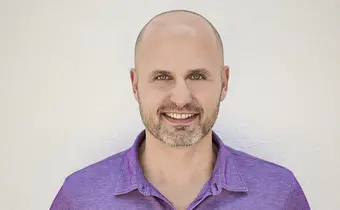
Laszlo Bock ’99
MBA
CEO and Co-founder, Humu
Laszlo Bock ’99 went to the Yale School of Management to transition out of his work in human resources. Yet, since leaving New Haven, he has led “people operations” at Google, written a best-selling book about how other companies can replicate Google’s people operations, and, most recently, co-founded an HR technology company that uses diagnostics, algorithms, and personalized nudges to change how employers and employees work.
So, what happened? Yale SOM.
At Yale, Bock took a course on operations with Professor Arthur J. Swersey that changed his view of his former field.
“There wasn’t a lot of operations management being applied to HR,” Bock says. “There were all these tools for how to do it and make it more efficient that weren’t getting used by anyone at that time.”
Bock’s path to that realization began after college. He was working as an actor and waiter when a professor in an accounting class helped direct him to a position at Hewitt Associates, an HR company. There, Bock discovered at a meeting with a client that a Hewitt partner didn’t know what NPV (net present value) meant. When Bock asked around, the only people who could define the term had MBAs. The disconnect between the business and HR personnel bothered him.
“That’s when I realized I needed an MBA,” he says. “NPV is a fundamental economic concept. Are you going to make money or are you going to lose money?”
Getting an MBA was a financial challenge, though. During his first year at Yale SOM, Bock had to take out an emergency loan; he also worked two days a week in Time Inc.’s HR department to help pay his way. Then he received a Frederick Frank ’54 B.A. Scholarship for his second year.
“I was grateful,” he says. In addition to allowing him to focus on his studies, Bock says, a named scholarship helped set him apart.
“The ability to say you were awarded this on the basis of x, y, or z, really helps with the job search,” he says. “You can add it to your résumé, and it makes you stand out.”
After graduation, Bock worked as a consultant at McKinsey & Company before deciding that human resources offered a more immediate way to lead.
“I realized that the best way to have an impact would be not to wait 30 years until maybe I’m lucky enough to become the CEO of a company but to go into HR and tomorrow start influencing things,” he says.
He cold-called two companies with highly regarded HR departments: Pepsi and GE. Only GE called back, and he started at the company six weeks later.
Bock was at GE during a leadership change, and he says the experience taught him that company culture is “fragile.”
“It underscored that the difference of a CEO spending less time on one thing and more time on another is enough for the entire organization” to change as a result, he says.
After joining Google in 2006, Bock applied his learnings from Yale SOM in operations and statistics to the company’s search for talent and people practices, creating the field of people analytics in the process. His decade there led him to write a book, Work Rules! Insights from Inside Google That Will Transform How You Live and Lead. In December 2016, Bock left Google, hoping to bring those insights to other organizations. A few months later, he launched Humu, which uses artificial intelligence to guide workplace improvements through what it calls its Nudge Engine.
Humu customers are major organizations ranging from Virgin Atlantic to Teach for America. Recently, it partnered with a call center that wanted to improve its resolution rates. With Humu’s help, the company realized its employees needed more downtime. Tiny, seconds-long breaks throughout the day made a huge difference and increased productivity by 13%.
“They’d squeezed as much productivity as they could out of the team,” Bock says. “And, in fact, their efforts to squeeze more productivity out were making things worse.”
Bock says he recently received an email from an employee at a company for which Humu had recommended more expressions of gratitude. The employee said she’d been secretly leaving notes for her co-workers, thanking them for their efforts.
“That’s not the kind of thing a manager can tell people to do; not even our algorithm can tell people to do that,” Bock says. “That’s somebody’s own creativity married with the permission we gave them to try something new. We don’t rely on a cascade of top-down management. We empower every single person to do cool things.”





